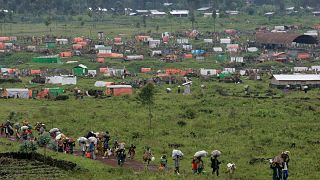Democratic Republic Of Congo
The sprawling Lake Tanganyika is the second deepest freshwater lake in the world, after Siberia's Lake Baikal.
The lake is shared between four countries, the Democratic Republic of Congo (DRC), Tanzania, Burundi and Zambia.
But now, this giant's waters are swallowing homes and roads, leaving scores of people homeless.
Experts say that due to persistent heavy rain, floods, strong winds and geological shifts, the lake waters have risen by perhaps over five metres in recent years.
Inhabitants of Kalemi, a province in Democratic Republic of Congo located on the shores of the lake, have been particularly impacted.
Dozens have lost their homes or plots of land, many have been forced to find shelter elsewhere, including in local schools and churches.
Local,Aline Sikuli points to heaps of debris and skeletons of destroyed homes on the lake's shores.
According to Sikuli, rising water levels have destroyed the province's port, disrupting local trade.
"We're living through a nightmare, Tanganyika has destroyed us all," she says.
"We don't know how our lives will be tomorrow."
Aluta Simba, another resident, says "only promises" have been made by local authorities to help those who have been displaced by rising water levels.
"Life was better before than the life we are leading today," he says.
"I live in this area, but on all fronts, there have been inequalities (in terms of assistance and those affected), especially on a social level and economic level."
Local politicians – including senator Francine Muyumba – are now calling the situation "a humanitarian emergency" and calling on the Congolese government to solve the crisis.
Muyumba says it's "important and urgent" for the government to provide solutions for citizens in distress.
"This is a humanitarian emergency, you know that these people have lost their homes, their belongings, and today most of them are almost abandoned," she says.
Among those trying to come up with solutions is former provincial minister of Tanganyika, Kaluma Abedi Ibrahim, who previously oversaw infrastructure, urban planning, land affairs and habitat.
On his office walls are plans for the reinforcement of the lake's shores.
He says that, as of yet, there are no plans to drain the lake.
According to Ibrahim, in three years, the lake's water levels rose by 5 to 6 metres and advanced inland by between 200 and 250 metres.
He says the DRC and places such as Kalemie have been disproportionately affected due to geographical factors.
Ibrahim warns the situation could deteriorate further in the next five years should no solution be found.













01:00
Pix of the Day: July 3, 2025
01:08
DRC extends ban on cobalt export for another three months
00:59
DR Congo's new opposition coalition launched in Kinshasa
01:07
WHO says the mpox outbreak remains a public health concern
Go to video
DR Congo may impose curbs on cobalt exports when existing ban ends
02:13
Congo’s rebel-held coltan mines continue to pump ore for world’s tech